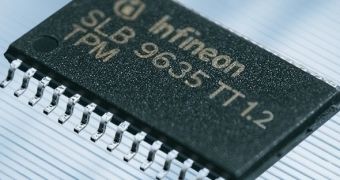Hardware-enabled security devices are quite storming the IT industry fronts lately. Ranging from miscellaneous biometric security devices (such as fingerprint readers or iris scanners) to hardware-based firewall solutions, they offer much better protection than any software-based equivalent on the market.
Lenovo was one of the first computer vendors to include them in its own computing products back in 2003. Two years later, HP and Dell joined the club and started delivering their own hardware security-enabled workstations. Mac systems are also making heavy use of them, despite their being "different" than the mainstream computers.
According to Steven Sprague, CEO of Wave Systems Corporation, more than 150 million PCs and laptops come rigged with the Trusted Platform Module (TPM) microprocessor, a hardware device that is used to store data encryption keys that represent the central piece of an informational puzzle stored on the computer's hard-drive. Shortly put, the chip is a keyring that stores the data encryption keys. Without the right key, the stored information represent nothing more that an useless pile of bytes. The chip also provides authentication services for users.
Intel plans on shipping the Trusted Platform Module as a core part of its upcoming chipsets, starting from the second quarter of the year. The TPM system is already a strong presence on the market and Sprague claims that "there's no excuse any more for organizations to overlook it." The largest obstacle in the implementation of hardware security solutions is the corporate IT department, that is less aware of the benefits hardware security can bring to computing.
The most important argument for using hardware protection systems is the fact that hardware cannot be hacked in. No matter how skilled, malware writers won't be able to fake a legit user. The hardware system is simple: either you physically type the password, or you are held at the computer's "gates". The IT industry could take significant advantage in using the TPM chips.

 14 DAY TRIAL //
14 DAY TRIAL //